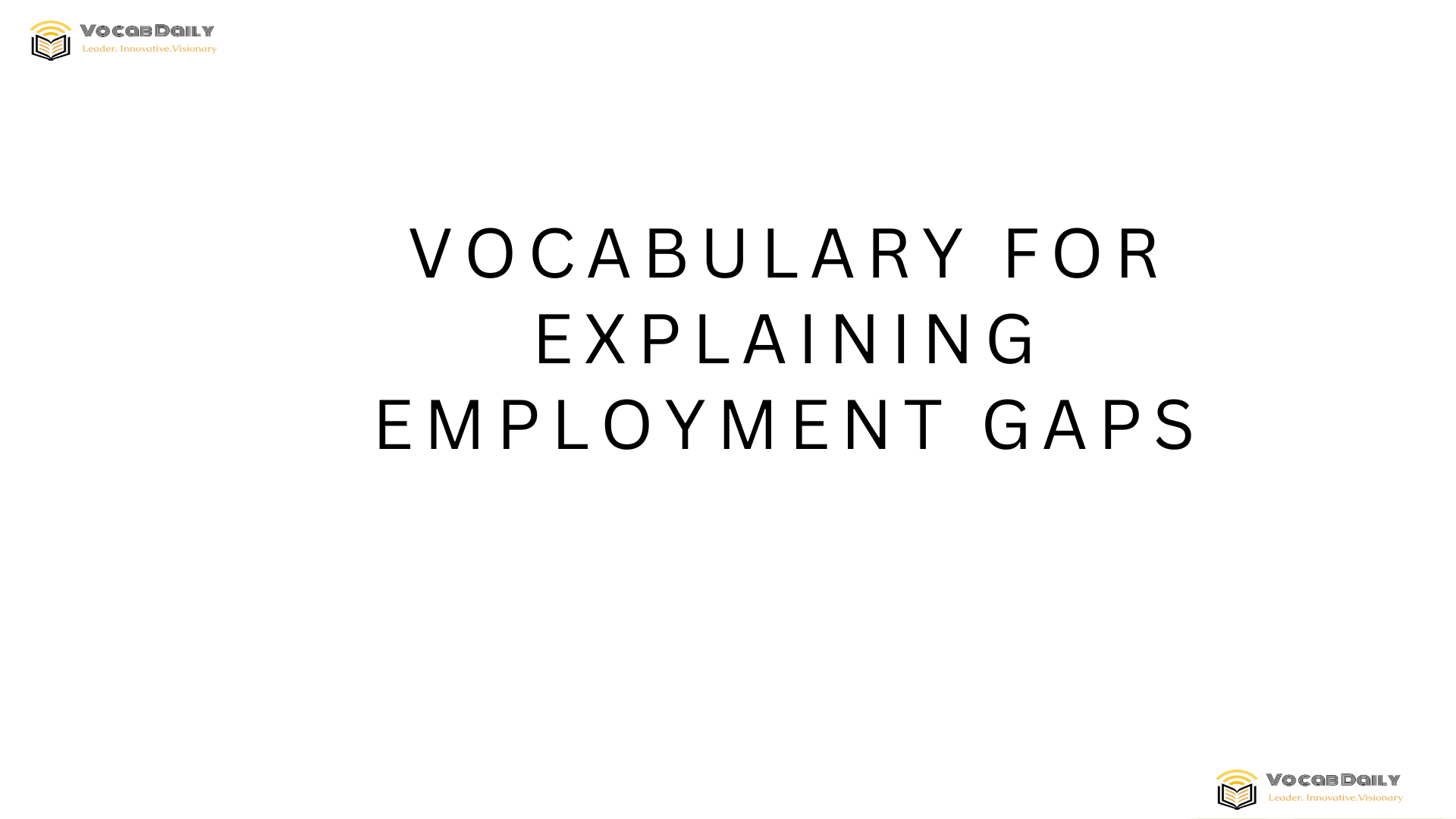Vocabulary for Explaining Employment Gaps
Employment gaps are common in many career paths, and explaining them effectively during an interview can make a significant difference in how potential employers perceive your application. Using the right vocabulary to describe these periods helps you communicate positively and professionally. This article will guide you through useful terms and phrases to explain employment gaps with confidence during job interviews, ensuring your explanations come across clearly and constructively.
Common Reasons for Employment Gaps
Employment gaps can occur for various reasons, and understanding the correct vocabulary to describe these reasons is essential. Employers typically appreciate honesty accompanied by proactive explanations. Here are some common terms to describe employment gaps:
Personal Development: This phrase indicates that you used the time to improve your skills, acquire new qualifications, or pursue further education. For example, “I took time off for personal development, including completing online courses.”
Family Responsibilities: Many people take time off work due to family needs, such as caregiving or raising children. Using this phrase shows your commitment while highlighting valid reasons for the gap.
Career Transition: Sometimes, individuals leave a job to change career paths. Describing your gap as a “career transition period” suggests that you spent the gap actively preparing for a new professional direction.
Health Reasons: If health issues caused the gap, mentioning “health reasons” or “medical leave” is appropriate. Always keep the explanation professional and brief, focusing instead on your readiness to return to work.
Travel or Volunteering: Taking time off to travel or volunteer can be seen positively, showcasing your personal growth or commitment to social causes.
Phrases to Frame Employment Gaps Positively
How you express employment gaps matters a lot. Instead of focusing on the absence of work, emphasize what you gained during that time. Here are some useful phrases:
-
“During this period, I focused on enhancing my skills in [specific area/industry].”
-
“I took this time to recharge and realign my professional goals.”
-
“This was a planned career break to attend to important personal matters.”
-
“I used this time to pursue certification in [field], which complements my previous experience.”
-
“This gap allowed me to explore volunteer opportunities that strengthened my teamwork and leadership skills.”
-
“I took a sabbatical to travel and gain broader cultural exposure, which I believe enriches my approach to work.”
Expressing Readiness and Enthusiasm
After explaining the employment gap, it’s important to steer the conversation toward your current readiness and enthusiasm for the role. Use vocabulary that reflects confidence and motivation.
Try phrases such as:
-
“I am now fully prepared and excited to bring my enhanced skill set to this role.”
-
“This period has given me a fresh perspective, and I am motivated to contribute effectively.”
-
“I am eager to re-enter the workforce and apply both my previous experience and new skills.”
-
“Having taken this time to focus on my personal and professional growth, I am ready to take on new challenges.”
Describing Short-Term Gaps
Short employment gaps are common and can be framed using simple, straightforward language. Including precise timeframes helps clarify the situation.
Useful vocabulary for short gaps includes:
-
“Between positions, I took a brief break to evaluate my career direction.”
-
“I spent a few months searching for the right position that aligns with my skills and interests.”
-
“There was a short sabbatical to attend to family matters.”
-
“I utilized this time to attend industry workshops and seminars.”
Handling Longer Employment Gaps
Longer employment gaps might require more detailed explanations. It’s important to balance transparency with a focus on growth and readiness.
Consider these ways to describe longer gaps:
-
“I took an extended leave to care for a family member, during which I maintained my professional knowledge through online courses.”
-
“During this period, I explored new interests and completed several certifications relevant to my field.”
-
“This was a transitional phase for me to redefine my career goals and equip myself accordingly.”
-
“I volunteered with non-profit organizations, developing skills in project management and communication.”
Vocabulary to Avoid When Explaining Employment Gaps
While honesty is valued, certain words or phrases may raise concerns if used carelessly. Avoid terms that could sound indefinite or negative, such as:
-
“Unemployed” – Instead, focus on what you were doing during that time.
-
“Laid off” or “fired” – If relevant, briefly mention this but quickly move on to positive actions you took afterward.
-
“Idle time” or “wasted time” – Never describe your gap negatively.
-
“Stopped working” without context – Always explain the reasons behind the gap.
Instead, use constructive and forward-looking phrases that turn the focus to your development.
Sample Sentences to Practice for Interviews
To help prepare you for interviews, here are some sample sentences that incorporate the vocabulary described above:
-
“After leaving my previous role, I took some time to enhance my skills in digital marketing through advanced courses and hands-on projects.”
-
“During a planned career break, I focused on family responsibilities while keeping updated with industry trends.”
-
“I used my employment gap as a valuable opportunity for professional growth by volunteering and earning additional certifications.”
-
“Although I was out of formal employment for several months, I remained committed to improving my skills and am enthusiastic about rejoining the workforce.”
Tips for Using Vocabulary Confidently
Besides knowing the right words and phrases, how you communicate them matters:
-
Be Honest: Genuine explanations build trust.
-
Stay Positive: Frame gaps as purposeful or beneficial.
-
Be Concise: Provide enough detail without over-explaining.
-
Practice Your Explanation: Rehearse your answers to feel comfortable during interviews.
-
Focus on the Present and Future: Emphasize your readiness to contribute now.
Remember, employment gaps happen to many people. Using appropriate vocabulary to explain these periods shows professionalism and can transform a potentially tricky question into an opportunity to highlight your resilience and growth.
Also check out VocabDaily workbook collections.

Leave a Reply